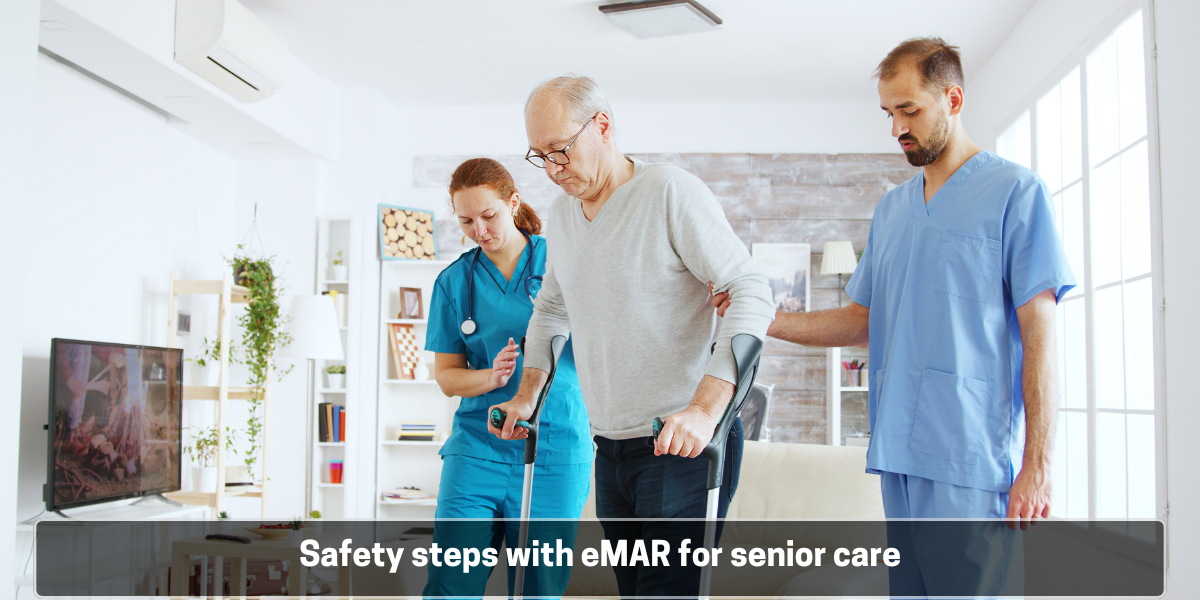Medication safety is very important in senior care. Many seniors take multiple medications daily. Caregivers must give the right medicine at the right time – as mistakes can harm residents and cause serious health problems.
Electronic medication administration records (eMAR) help caregivers manage medications safely. These systems replace paper records and reduce errors. eMAR improves accuracy, tracks missed doses, and ensures proper documentation. Many senior care facilities in the UK now use eMAR to improve resident safety.
Caregivers must follow key safety steps to get the best results from eMAR. Proper training, clear communication, and regular checks help prevent mistakes. Here, we explain the most important safety steps for using eMAR in senior care.
Training on eMAR systems
All caregivers must know how to use eMAR correctly. Staff should receive full training before using the system. Regular training sessions help caregivers stay updated on system changes. Mistakes happen when staff do not know how to record medication properly. Training ensures they enter the right information and follow safety rules. Managers should check staff knowledge and provide extra training when needed.
Verify medication details before administration
Before giving any medication, caregivers must check the details carefully. The eMAR system shows the medication name, dosage, and instructions. They must always compare this information with the prescription. Giving the wrong medication or dosage can cause serious harm. Double-checking reduces the risk of errors. If something looks wrong, they should ask a nurse or doctor before giving the medication.
Record administration in real time
Medication records must be updated immediately. Caregivers should log each dose in the eMAR system as soon as it is given. Delayed recording can lead to confusion and missed doses. Real-time updates help other staff members stay informed. If someone else checks the system later, they can see exactly what was given. This improves teamwork and prevents double dosing.
Monitor for missed doses
Missed doses can harm residents, especially those with serious conditions. The eMAR system alerts caregivers if a dose is late or missed. Staff must check these alerts and act quickly. If a dose is missed, caregivers should follow facility procedures. Some medications must be given within a certain time. Others may need a doctor’s advice before being given late.
Store medications securely
All medications must be stored in a safe place. Care homes should keep medications in locked cabinets or secure rooms. Only authorised staff should have access. Proper storage prevents loss, theft, or accidental overdose. Some medications need special conditions, like refrigeration. Caregivers must check storage guidelines and follow them correctly.
Report and review medication errors
Even with eMAR, mistakes can happen. If an error occurs, staff must report it immediately. The eMAR system usually has a way to record incidents. Managers should investigate errors and find ways to prevent them. Learning from mistakes helps improve care. Regular reviews of medication errors can highlight areas for improvement.
Update records when medications change
Doctors may change a resident’s medication based on their health needs. Caregivers must update the eMAR system as soon as changes are made. Outdated records can lead to incorrect doses. Staff must always check that the system matches the latest prescription. If there is any doubt, they must confirm with a doctor or pharmacist.
Conduct regular audits
Senior care managers should review eMAR records regularly. Audits help find mistakes, improve procedures, and ensure compliance with safety rules. Audits can show patterns of missed doses or incorrect entries. Identifying problems early helps prevent serious incidents. Facilities should have a schedule for routine checks.
Ensure system security and data protection
eMAR systems store sensitive medical information. Care facilities must follow UK data protection laws to keep this information safe. Staff should use strong passwords and log out after using the system. Only authorised personnel should have access to resident records. Cybersecurity measures help prevent unauthorised access.
Good communication is key to medication safety. Caregivers must share important updates with each other. eMAR systems improve tracking, but human oversight is still essential. Staff should report concerns and discuss any issues with colleagues. Clear communication prevents misunderstandings and ensures residents receive the right care.







